Before the team at Australians Farmers’ hang up our boots for 2018, we took a look back at the year that was in agriculture – the big issues, the wins and the ongoing challenges.
January
- On 9 January newly appointed Agriculture and Water Resources Minister, David Littleproud makes meeting with the National Farmers’ Federation a first priority. The Minister, President and CEO discuss water, energy, land-use management, trade, labour and telecommunications.

- The Trans-Pacific Partnership comes back from the dead with the remaining parties to the agreement, forging a path forward without the United States.
- ‘Team Australian Agriculture’ embarks on a trade reconnaissance mission to the UK and the EU to explore new opportunities for Australian agriculture in a post-Brexit world.
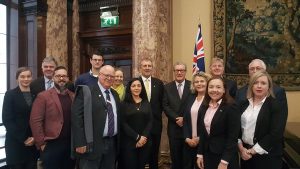
February
- The year begins with the Murray Darling Basin Plan under serious threat. Parliamentary disagreement rages about the measures to effect the required 450 gigalitres of ‘upwater’. The Greens make clear their intention to vote against the crucial Northern Basin Review amendments, Labor teeters and the NFF calls for the Parliament to stay the course with the Plan.
- The first meeting of the NFF Horticulture Council takes place at NFF House. The Council is a dedicated, united and tailored body to represent the best interests of Australia’s $11 billion production and ornamental horticulture sectors.
- The Regional, Rural and Remote Communications Coalition descends on Canberra to call for 2018 to be a year of action on telecommunications, in particular one that addresses: mobile blackspot funding; continued access to reliable voice telephone services; and a consultative approach to the Regional Telecommunications Review.
March
- Government, Members and agribusiness support NFF in the inaugural Diversity in Agriculture Leadership Program, a one-on-one mentor program designed to see more women in industry leadership roles. Applications open on International Womens’ Day.
- The NFF welcomes the Government’s agriculture-specific review of the Environmental Protection and Biodiversity Act.
- At the Royal Sydney Easter Show, Prime Minister Malcolm Turnbull launches NFF’s Talking 2030 Discussion Paper kicking off a national roadshow, consulting with farmers and others involved in agriculture on how to achieve a farm gate output of $100 billion by 2030. The Talking 2030 initiative was made possible by NFF’s partnership with Telstra.
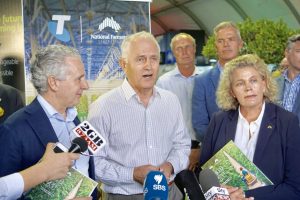
April
- The NFF’s 2018 Farm Workforce Survey finds two thirds of those surveyed rated labour supply as amongst their top three challenges, citing problems with labour, employment costs, and red tape.
- Farmers are horrified by footage aired by 60 Minutes of sheep suffering aboard a vessel bound for the Middle East. The NFF demands changes to Australia’s live sheep exporting regulations to ensure the welfare of animals and a sustainable future for the livestock export industry. Minister Littleproud’s ‘short, sharp’ review of the ‘Conditions of Northern Summer Exports’ (the McCarthy Review) is welcomed.
- The NFF calls time on energy policy consternation directing the Council of Australian Governments meeting to give the green light to the progression of the Government’s National Energy Guarantee. COAG fails to deliver.
- The Regional, Rural and Remote Communications Coalition outlines what it expects of the Regional Telecommunications Review.
May
- The Talking 2030 Roadshow kicks off in York, Western Australia. Over the course of the following four months, the NFF will host 19 roundtables across Australia to get input from agriculture’s best and brightest on how the farm sector can notch up $100 billion in farm gate output by 2030.
- After a sustained advocacy effort by the NFF and Basin communities,bipartisan agreement is reached for the continued implementation of the Basin Plan. The President congratulates Minister Littleproud and Opposition Water spokesperson Tony Burke, calling it a win for farming families and communities up and down the Basin.
- The NFF President joins Queensland farmers at an AgForce rally at Parliament House, Brisbane to protest unfair land management laws.

- Eight outstanding female agriculture leaders of the future are selected for NFF’s Diversity in Agriculture Leadership Program. More than 120 women applied to take part in the programme. The mentees attend a introductory workshop at NFF headquarters and a special luncheon at Parliament House. Government, members and agribusiness, partner with the NFF on the program and pledge to work towards meaningful change towards gender diversity within their organisations.
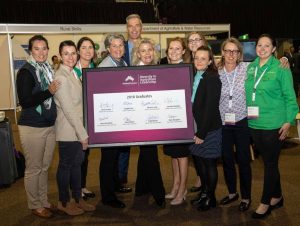
- A delegation of producers representing Sheep Producers Australia (SPA), WAFarmers and the NFF meet with MPs and Senators in Canberra calling on the Parliament to assist with improving and retaining Australia’s live sheep export industry. Their message is clear – fix it, don’t ban it.
- The NFF awards the Government a B+ for the 2018 Federal Budget, awarding top marks for investment in market access; biosecurity; and data collection to quantify labour shortages. Marks are deducted for overlooking regional telecommunications.
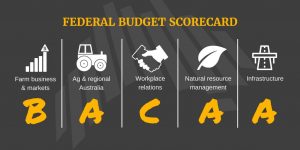
- The McCarthy Review, looking at the conditions of the export of sheep to the Middle East in the norther summer, is released. The review recommends sheep be afforded up to 39% more space and overall stocking densities be reduced by up to 28%, during the northern summer months.
- The NFF welcomes the official start of negotiations towards a free trade agreement (FTA) with the European Union (EU).
June
- As drought tightens its grip on the eastern seaboard, the NFF President joins Prime Minister Malcolm Turnbull, Agriculture Minister David Littleproud and other MPs on a tour of drought-affected NSW. The NFF welcomes the Government’s extension of the Farm Household Allowance from three to four years.
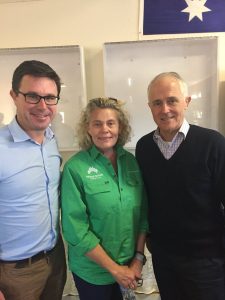
July
- The NFF, Sheep Producers Australia and WAFarmers launch the Live Export Facts website. Farmers, a livestock carrier and local government Mayor explain the significance of the trade and the impact on their businesses and communities if it was to cease.
- Hosted by Minister Littleproud, the NFF attends a Ministerial drought meeting in Canberra with state farming organisations and representatives of the major rural lenders. NAB joins Rural Bank as the only rural lenders to provide a Farm Management Deposit offset scheme.
- The NFF welcomes the Federal Court’s decision on piecework provisions. The Court found that the piecework rate should be based on a proper examination of the productivity of a hypothetical ‘average competent worker’ within the circumstances of the workplace.
- In Farm Safety Week the NFF teams up with Farm Safe Australia and Fairfax Agricultural Media to publish the Safe Hands lift out. The publication was launched by Paralympian, Scott Reardon who lost his leg in a tractor accident when he was 11 years old.
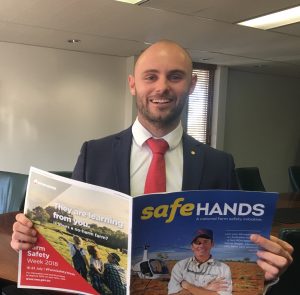
- In collaboration with the Australian Rural Leadership Foundation, the NFF calls for applicants to take part in the 2030 Leaders Program. Eight talented, ag-focussed Australians are selected.

- The NFF calls on the Government to register its disappointment with the United States’ administration’s decision to introduce $12 billion of new subsidies for its farmers and rallies Cairns Group Farm Leaders to register a trans-national protest of the subsidies.
- NFF President, Fiona Simson addresses the National Press Club.
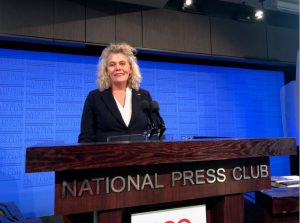
August
- Generous Australians want to help drought-affected farmers. The NFF teams up with the Channel 9 and Rotary Australia to establish the 2018 Drought Relief Appeal. The NFF will oversee the distribution of funds via a specially formed Drought Appeal Sub-Committee. In Canberra, the NFF convenes a meeting of charities and other drought relief organisations.The CEO takes part in the Channel 9 Drought Appeal Telethon in Dubbo.

- During the month, in two separate announcements, the Turnbull Government extends its drought assistance package to include changes and more investment in the Farm Household Allowance; the Rural Financial Counselling Service; mental health services; depreciation of fodder infrastructure; the expansion of Regional Investment Corporation loans; local government water projects; and weather forecasting. The announcements take the Federal Government’s drought support to $1.8 billion. All remaining rural lenders announce an FMD offset.
- The farm sector maintains pressure on Federal and State Energy Ministers to support the National Energy Guarantee. The NFF lends its support to a joint statement by more than 20 industry groups and businesses, encouraging support for the NEG.
- The NFF, Channel 9 and Rotary Drought Relief Appeal distributes the first $1 million raised to charities providing drought relief including the CWA and Need for Feed – a Lions Club initiative. By December, the fund will have dispersed $7.9 million to reputable charities and drought support programmes. A total of $10 million was raised. The remaining $2 million will be disbursed early in 2019.
- The NFF President congratulates Scott Morrison on his new role as Prime Minister and thanks Malcolm Turnbull for this his interest in and action on agricultural matters. PM Morrison makes drought his first priority visiting drought-affected Queensland on the Sunday after his Friday visit to Government House. The NFF President, Vice President and CEO meet with the PM in Canberra on the following Tuesday.

- President Fiona Simson, joins Prime Minister Morrison in Jakarta for the signing of the Indonesia-Australia Comprehensive Economic Partnership Agreement. Under IA-CEPA, a diverse range of Australian farm produce will be granted even wider access to the burgeoning south-east Asian economy including cattle, beef, sheepmeat, dairy, sugar, fruit, vegetables and honey.

September
- Agriculture Minister David Littleproud and Deputy Prime Minister Michael McCormack express their support for NFF’s proposed Agricultural-specific Visa to help ease the farm sector’s labour woes. Australian Farmers launches a campaign to explain why we need an Ag Visa.
- The #QuadsforLife campaign is launched on Australian Farmers, to highlight the need to adopt the Australian Competition and Consumer Commission (ACCC) recommendations to improve quad bike safety: 1) fit crush protection devices (CPDs) on all new quad bikes; and 2) introduce a five-star safety rating system.

- The Regional, Rural and Remote Communications Coalition welcomes the Federal Government’s announcement that it will soon identify location options for the next round of mobile black spot funding.
- On NFF’s advice, the PM acts to restore common sense to load dimensions across the states of South Australia, Victoria, New South Wales, Queensland, to make carting hay across state borders easier. The President joins the PM for the announcement, at Royalla, just south of Canberra.
October
- The President is interviewed by ABC Four Corners for its Monsanto Papers program looking at the safety and regulation of glyphosate. The NFF initiates the ‘What you need to know about glyphosate’ campaign.
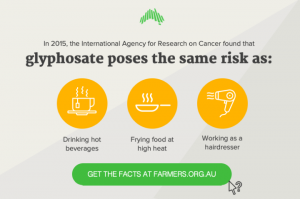
- The NFF is pleased to be asked to be part of the Federal Government’s Drought Finance Taskforce.
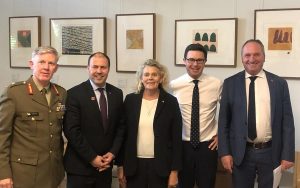
- The NFF again, calls for action on high energy prices.
- More than 300 delegates converge on the Australian Institute of Sport for the NFF’s National Congress. In keeping with the theme, ‘DIVERSIFY’, more than 30 speakers keep delegates engaged talking across topics of people; leadership; global markets and innovation. On Day 1 President Fiona Simson, launches NFF’s 2030 Roadmap – a plan to see agriculture achieve a farm gate output of $100 billion by 2030. The Roadmap is a result of the Talking 2030 process. The NFF’s new-look Year in Review is also unveiled, a partnership with Fairfax Agricultural Media.
- On Day 2, Prime Minister Scott Morrison attends and confirms his Government’s commitment to an Agricultural Visa and Shadow agriculture spokesperson, Joel Fitzgibbon says if elected, Labor would develop a National Agriculture Plan.
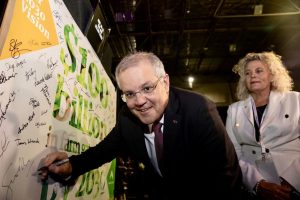
- Also during Congress, the NFF’s 2030 Leaders (below) and Diversity in Agricultural Leadership Program participants (below) graduate.
- The NFF, and members, attend Prime Minister Morrison’s Drought Summit in Canberra. The Summit ends with an announcement of a $5 billion Future Drought Fund, including funding for the NFF to create a one-stop portal for drought information, named the ‘Farm Hub’. The NFF welcomes the Fund, but is disappointed with the lack of progress towards a renewed and revised Intergovernmental Agreement on Drought or National Drought Policy.
- Minister for Agriculture, David Littleproud, releases the findings of the Moss Review, examining the capability and culture of the live export regulator – the Department of Agriculture and Water Resources. The NFF welcomes the finding that significant change is needed to ensure community standards are met.
- The TPP-11 is ratified by the Australian Parliament, in time to provide farmers with a double tariff cut on 30 December 2018 and 1 January 2019.
- Funded by the National Heavy Vehicle Regulator, the NFF launches the ‘Common Roads, Common Sense’ campaign to create an awareness of the presence of large agricultural vehicles on public roads. The campaign is launched by the Deputy Prime Minister near Wagga Wagga, NSW.
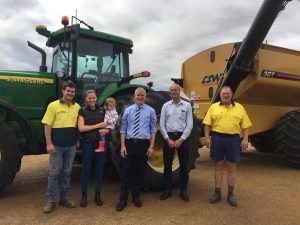
- Australia celebrates National Agriculture Day on 21 November. The NFF hosted ‘activations’ in the CBDs of Sydney and Melbourne; hosted the AgDay photo competition and commissioned the National Agriculture Day Poll. More than 7500 people across Australia hosted AgDay events and more than 2 million social media accounts were reached.
November
- Advocacy by the NFF results in changes to the Seasonal Workers Programme and the Working Holiday Visa to ensure they are better structured to ease the farm sector’s labour woes.
- The Regional, Rural and Remote Communications Coalition welcomes plans by the National Broadband Network to make browsing, email and software updates exempt from Sky Muster data meterage.
- The NFF welcomes the Government’s support for Australian cane growers by calling time, via the World Trade Organisation, on India’s sugar subsidies.
- Australia celebrates National Agriculture Day on 21 November. The NFF hosted ‘activations’ in the CBDs of Sydney and Melbourne; hosted the AgDay photo competition and commissioned the National Agriculture Day Poll. More than 7500 people across Australia hosted AgDay events and more than 2 million social media accounts were reached.
- The NFF expresses disappointment, but is not surprised, at the findings of the Harvest Trail Report.
- Labor announced its plan for Australia’s energy market. The NFF expresses concern over the targets outlined.
- The NFF President and Pru Gordon, NFF’s Trade and Economics General Manager, undertake a trade mission to the UK and EU. Appointments include meetings with the Australian High Commissioner to the UK, George Brandis; the UK National Farmers Federation; the Australian Ambassador to the EU and NATO, Justin Brown; Europe’s peak ag association COPA-COGECA and the Irish Farm Association (including a farm visit). A key part of the trip is the President’s participation in the Australia EU Leadership Forum.
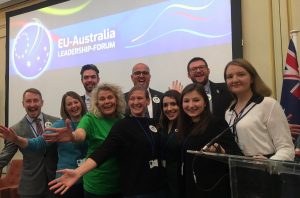
- WAFarmers President Tony York joins the NFF Board of Directors. Cattle Council President Tony Hegarty is also reelected.
December
- The NFF and the Regional, Rural and Remote Communications Coalition welcomes the focus on the maintenance of the Universal Service Obligation for landlines; increased and smart data meterage and more work on digital literacy and inclusion
- The NFF President expresses disappointment at COAG’s failure to progress a National Drought Policy.
- Breakthrough for the Murray Darling Basin as Water Ministers endorse focussing on the socio-economic impact of ‘upwater’ measures.


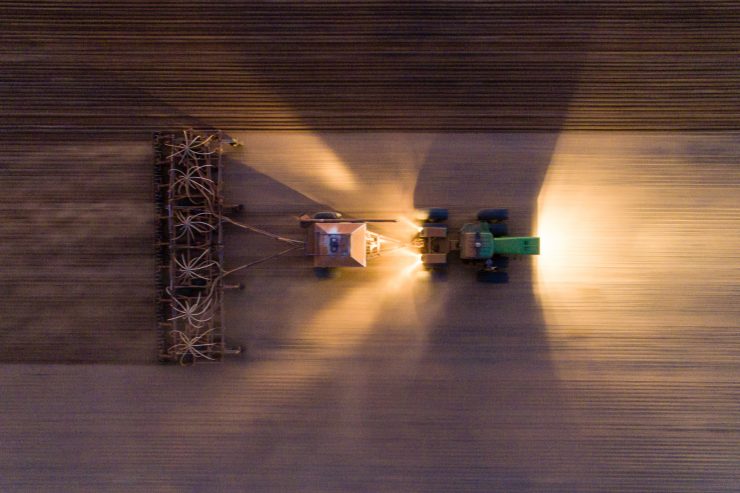
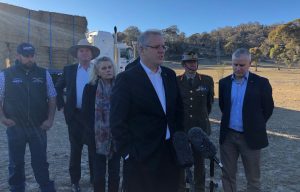


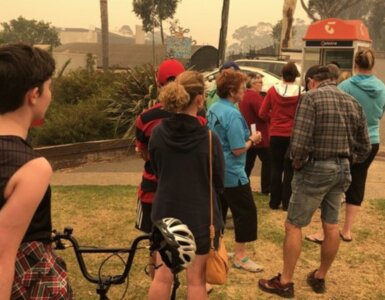
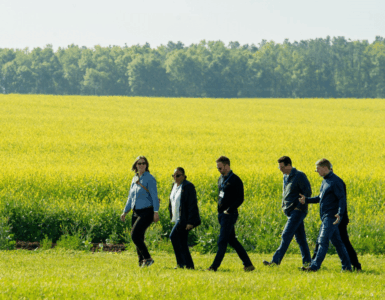
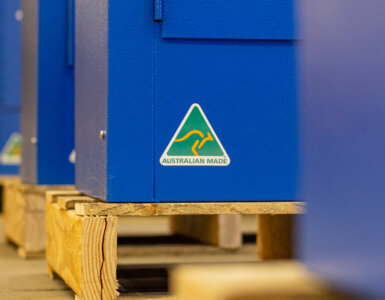































Add comment